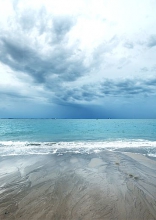
For decades, the North Sea has played a central role in the European energy landscape because of its historical wealth of fossil fuels. However, the North Sea region also has many assets to play a key role - now and in the future - in the fight against climate change. In its latest policy informing brief, VLIZ examined various marine climate mitigation approaches and selected five that can be realised in the North Sea: (1) Offshore renewable energy, (2) Carbon capture and storage (CCS), (3) Marine geo-engineering, (4) Blue Carbon and (5) Marine reserves. While each of the different avenues holds some promise, there also appear to be important ecological and social concerns.
That our earth is heating up is now a widely accepted and well-established fact. However, climate scientists are accumulating growing evidence that the international climate effort in its current form will fail to limit global warming to a level at which the worst of the climate damage can be avoided. In other words, there is a need for decisive and realistic options to strengthen and accelerate climate action in the short term.
Until now, policymakers have mainly focused on land-based possibilities to slow down climate change, but today there is also growing attention for the mitigation potential of the ocean, the so-called oceanic or marine climate mitigation. After all, the ocean is naturally an important storage place for CO2 (every year, 25-30% of the CO2 emitted by humans is absorbed by the ocean). But the seas and oceans also hold other assets, such as an enormous availability of open space, waves, tides, currents, etc. that can be used in the context of climate mitigation. Moreover, thanks to current scientific insights and technological possibilities, we are now able to use and even increase the mitigation potential of these assets.
The North Sea also offers a lot of opportunities in the fight against climate change, as is shown in a new policy informing brief from VLIZ. This brief takes a closer look at the potential, the feasibility and the ecological and social advantages and disadvantages of five marine climate mitigation approaches that can be realised on our North Sea: (1) Offshore renewable energy, (2) Carbon capture and storage (CCS), (3) Marine geo-engineering, (4) Blue Carbon and (5) Marine reserves.
This desktop analysis shows that some approaches - both industrial and natural - can offer promising opportunities. But almost all strategies still need a solid dose of scientific research to support both policy makers and society to better understand the implications of these marine climate mitigation and adaptation strategies in a changing world.
We must also bear in mind that, regardless of the success in limiting global warming, the Earth (including the ocean) will still experience significant climate stress and damage. This means that in their climate policy, governments can no longer separate climate mitigation from climate adaptation (coastal defences, water supply, heat resistant measures, etc.). Marine climate mitigation cannot and should not be seen as a substitute for land-based climate actions, but should be complementary to the range of already existing options. In any case, it is crucial to have a strong multidisciplinary cooperation, transparency and communication towards a sustainable, socially accepted and effective marine climate mitigation strategy that will allow us to come closer to our climate goals without compromising our prosperity or well-being.
Reference:
Dauwe, S.; Verleye, T.; Pirlet, H.; Martens, C.; Sandra, M.; Moulaert, I.; De Raedemaecker, F.; Devriese, L.; Chisala, C.; Mees, J. (2021). Mariene klimaatmitigatie: een wetenschappelijke synthese van de meest pertinente oplossingsrichtingen voor het Noordzeegebied. VLIZ Beleidsinformerende Nota's, 2021_003. Vlaams Instituut voor de Zee (VLIZ): Oostende. 70 pp. [Meer]
You can download the policy informing brief here.